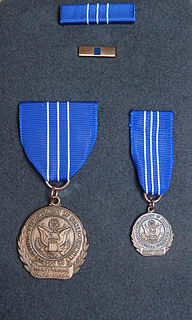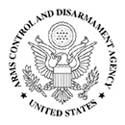
The Legion of Merit (LOM) is a military award of the United States Armed Forces that is given for exceptionally meritorious conduct in the performance of outstanding services and achievements. The decoration is issued to members of the seven uniformed services of the United States as well as to military and political figures of foreign governments.
The Meritorious Unit Commendation is a mid-level unit award of the United States Armed Forces. The U.S. Army awards units the Army MUC for exceptionally meritorious conduct in performance of outstanding achievement or service in combat or non-combat, the U.S. Navy and U.S. Marine Corps award units the Navy MUC for valorous or meritorious achievement or service in combat or non-combat, and the U.S. Coast Guard awards units the Coast Guard MUC for valorous or meritorious achievement or service not involving combat.

The United States Armed Forces awards and decorations are primarily the medals, service ribbons, and specific badges which recognize military service and personal accomplishments while a member of the U.S. Armed Forces. Such awards are a means to outwardly display the highlights of a service member's career.
The NATO Medal is an international military decoration which is awarded to various militaries of the world under the authority of the North Atlantic Treaty Organization (NATO). It is manufactured by Eekelers-Centini Intl, of Hemiksem, Belgium. There are currently fourteen versions of the NATO Medal in existence, for service in the former Yugoslavia, Kosovo, Macedonia, two for service during Article 5 operations, and eight for Non-Article 5 NATO operations. In addition, there are corresponding clasps for operations such as ISAF, Kosovo, the former Yugoslavia, NTM-I, and clasps designating Article 5, and Non-Article 5 designations. There is also a NATO Meritorious Service Medal, with a "Meritorious Service" clasp as well. However, U.S. military personnel do not wear the clasps on the NATO Medals, since the U.S. has its own devices that are used instead.
Awards and decorations of the United States Air Force are military decorations which are issued by the Department of the Air Force to Air Force service members and members of other military branches serving under Air Force commands. Of all five branches of the United States Armed Forces, the United States Air Force currently maintains the highest number of active awards and decorations, including many without equivalent in any other service.

The Distinguished Honor Award is an award of the United States Department of State. Similar versions of the same award exist for the former U.S. Information Agency, Arms Control and Disarmament Agency, and USAID. It is presented to groups or individuals in recognition of exceptionally outstanding service or achievements of marked national or international significance.

The Superior Honor Award is an award of the United States Department of State. Similar versions of the same award exist for the former U.S. Information Agency, Arms Control and Disarmament Agency, and USAID. It is presented to groups or individuals in recognition of a special act or service or sustained extraordinary performance covering a period of one year or longer.
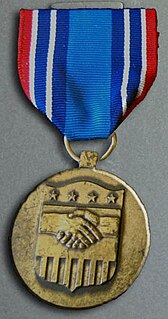
The Meritorious Honor Award is an award of the United States Agency for International Development. Similar versions of the same award exist for the former U.S. Information Agency, Arms Control and Disarmament Agency, and Department of State. It is presented to groups or individuals in recognition of a special act or service or sustained outstanding performance.

The Superior Honor Award is an award of the United States Agency for International Development. Similar versions of the same award exist for the former U.S. Information Agency, Arms Control and Disarmament Agency, and Department of State. It is presented to groups or individuals in recognition of a special act or service or sustained extraordinary performance covering a period of one year or longer.

The Superior Honor Award is an award of the United States Arms Control and Disarmament Agency, an independent agency charged with implementing and verifying arms control strategies which has since been merged into the Department of State. Similar versions of the same award exist for the United States Agency for International Development, the Department of State, and the former U.S. Information Agency. This award has been replaced with the State Department's Superior Honor Award. This award was presented to groups or individuals in recognition of a special act or service or sustained extraordinary performance covering a period of one year or longer.
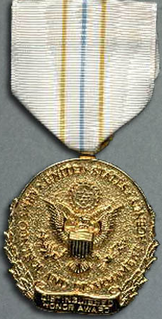
The Distinguished Honor Award is an award of the United States Arms Control and Disarmament Agency, an independent agency charged with implementing and verifying arms control strategies which has since been merged into the Department of State. Similar versions of the same award exist for the United States Agency for International Development, the Department of State, and the former U.S. Information Agency. This award has been replaced with the State Department's Distinguished Honor Award. This award was presented to groups or individuals in recognition of exceptionally outstanding service or achievements of marked national or international significance.

The Distinguished Honor Award is an award of the United States Agency for International Development. Similar versions of the same award exist for the former U.S. Information Agency, Arms Control and Disarmament Agency, and Department of State. It is presented to groups or individuals in recognition of exceptionally outstanding service or achievements of marked national or international significance.

The Meritorious Honor Award is an award of the United States Information Agency, an independent agency charged with public diplomacy which has since been merged into the Department of State. Similar versions of the same award exist for the United States Agency for International Development, the Department of State, and the former Arms Control and Disarmament Agency. This award has been replaced with the State Department's Meritorious Honor Award. This award was presented to groups or individuals in recognition of a special act or service or sustained outstanding performance.

The Superior Honor Award is an award of the United States Information Agency, an independent agency charged with public diplomacy which has since been merged into the Department of State. Similar versions of the same award exist for the United States Agency for International Development, the Department of State, and the former Arms Control and Disarmament Agency. This award has been replaced with the State Department's Superior Honor Award. This award was presented to groups or individuals in recognition of a special act or service or sustained extraordinary performance covering a period of one year or longer.
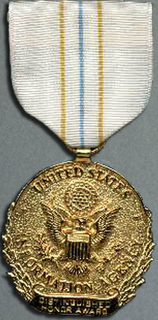
The Distinguished Honor Award is an award of the United States Information Agency, an independent agency charged with public diplomacy which has since been merged into the Department of State. Similar versions of the same award exist for the United States Agency for International Development, the Department of State, and the former Arms Control and Disarmament Agency. This award has been replaced with the State Department's Distinguished Honor Award. This award was presented to groups or individuals in recognition of exceptionally outstanding service or achievements of marked national or international significance.
Ambassador Thomas Graham Jr. is a former senior U.S. diplomat. Graham was involved in the negotiation of every single international arms control and non-proliferation agreement from 1970 to 1997. This includes the Strategic Arms Limitation Talks, the Strategic Arms Reduction Treaties, the Anti-ballistic missile (ABM) Treaty, Intermediate-Range Nuclear Forces Treaty (INF) Treaty, Treaty on the Non-Proliferation of Nuclear Weapons Treaty (NPT), Treaty on Conventional Armed Forces in Europe (CFE) Treaty and Comprehensive Nuclear-Test-Ban Treaty (CTBT). In 1993, Ambassador Graham served as Acting Director of the Arms Control and Disarmament Agency (ACDA) from January to November, 1993 and Acting Deputy Director from November, 1993 to July, 1994. From 1994 through 1997, he was president Bill Clinton's special representative for Arms Control, Non-Proliferation, and Disarmament. Graham successfully led the U.S. government efforts to achieve the permanent extension of the NPT in 1995. Graham also served for 15 years as the general counsel of ACDA. Throughout his career, Thomas Graham has worked with six U.S. Presidents including Presidents Richard Nixon, Gerald Ford, Jimmy Carter, Ronald Reagan, George H. W. Bush, and Bill Clinton. Ambassador Graham worked on the negotiation of the Chemical Weapons Convention and the Biological Weapons Convention and managed the Senate approval of the ratification of the Geneva Protocol banning the use of chemical and biological weapons in war, as well as the Biological Weapons Convention.
